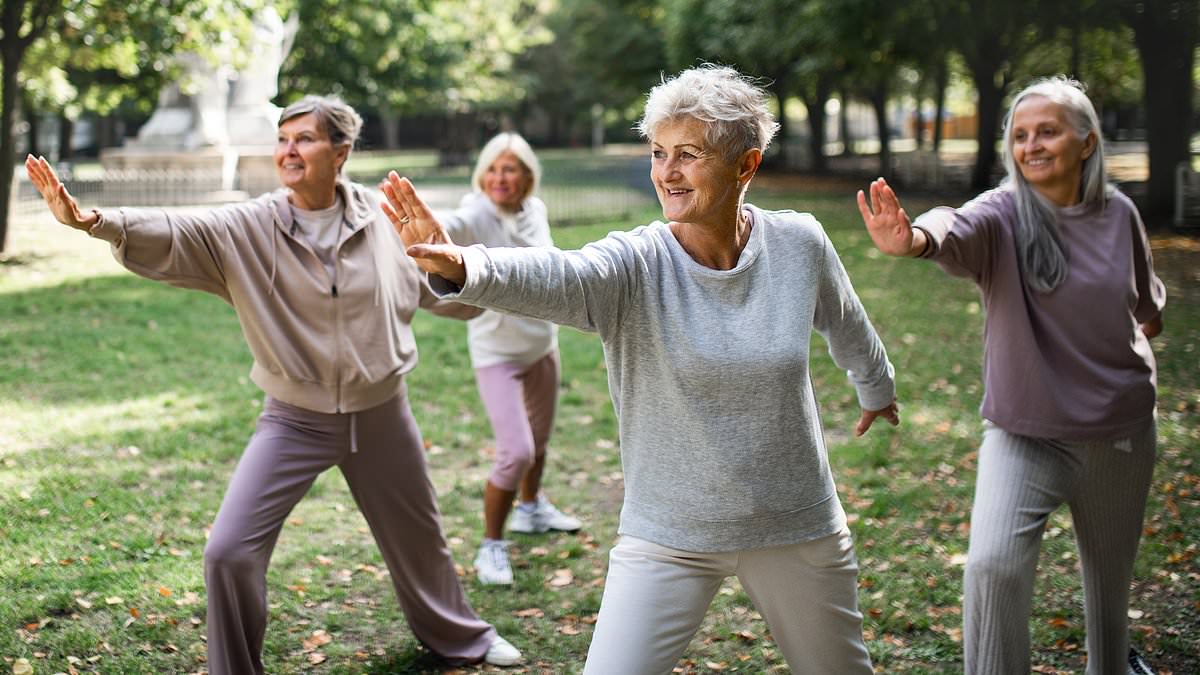Copyright dailymail

Forget painkillers! Ancient Chinese exercise could be key to reduce agonising knee pain caused by osteoarthritis, scientists say READ MORE: I'm a surgeon and this is why your knee pain isn't going away By EMILY STEARN, SENIOR HEALTH REPORTER Published: 15:00 GMT, 27 October 2025 | Updated: 15:07 GMT, 27 October 2025 The ancient Chinese martial art Tai Chi could tackle crippling knee pain, research has suggested. Osteoarthritis, as it is known medically, affects 10 million people in the UK, according to charity Versus Arthritis. Exercise, weight management and physiotherapy are common approaches recommended by medics, but it is often not enough to manage pain and stiffness. Yet current pain relief options are also limited, short term, and often have minimal benefit. Now, Australian researchers who tracked almost 200 patients with the condition, found the exercise approach was almost twice as effective at relieving pain compared to those who did not practice tai chi. Until now, a lack of evidence around complementary approaches has meant health professionals have not been able to recommend them. But the researchers say their findings could help doctors, who frequently see patients with chronic pain, be able to inform patients on which treatments will best help them manage their symptoms. Writing in the journal JAMA Internal Medicine, the scientists from the University of Melbourne, said tai chi offered an 'effective, accessible and scalable option to improve patient access to exercise'. Australian researchers who tracked almost 200 patients with the condition, found the exercise approach was almost twice as effective at relieving pain compared to those who did not practice tai chi (stock image) This could 'potentially reduce demand on health professionals and optimise health care resources', they added. Osteoarthritis — or wear and tear arthritis — occurs when the protective cartilage on the end of bones breaks down over time, causing pain, swelling and problems moving the joint as bone rubs against bone. The knee is the joint most likely to be affected, accounting for just over half of all cases of the condition. Surveys carried out by the charity Versus Arthritis show a third of people with osteoarthritis experience severe pain every day. In the study, researchers split 178 participants with osteoarthritis, aged 61 on average, into two groups of 89. One group was allocated a 12-week unsupervised online tai chi course to complete alongside access to online materials about the benefits of exercise to those with osteoarthritis and information on tai chi. The control group, meanwhile, simply had access to the online resources. Over a follow-up of three months, they found 73 per cent of the tai chi group saw a 'clinically important difference in pain' compared to just 47 per cent of the control group. Osteoarthritis — or wear and tear arthritis — occurs when the protective cartilage on the end of bones breaks down over time, causing pain, swelling and problems moving the joint as bone rubs against bone Almost three quarters (72 per cent) of the control group also saw a 'clinically important' difference in how the knee functioned compared to 52 per cent of the control group. Writing in the journal, the researchers said there was 'improved knee pain and function in people with knee osteoarthritis when compared with an online educational program alone'. They added: 'The benefits appeared to be of a clinically relevant magnitude and the intervention was safe with no serious adverse events.' However, they did acknowledge that the study had some limitations, including the fact it was only 12 weeks in length, limiting them from discovering the long-term effects of online tai chi. Experts reveal the six simple steps to ease the agony of knee pain - and avoid surgery Equally, participants were required to have internet access and own a device, 'so findings may not fully generalise to populations who are digitally excluded', they noted. Currently in the UK, joint replacements can be considered for long term relief for those with very advanced osteoarthritis. But NHS waiting lists are often long and people face many years in pain. In recent years, experts have also recommended certain lifestyle swaps to help reduce the agony of knee pain. While there is no magic diet for osteoarthritis, there is some evidence that the omega-3 polyunsaturated fatty acids found in oily fish 'have anti-inflammatory properties that may well be of benefit', according to the British Dietetic Association (BDA). Eating a Mediterranean diet might also help. One 2016 British study found participants put on the plan not only lost weight but also slashed signs of inflammation and breakdown of cartilage in the body. Their range of knee flexibility or hip rotation was found to have increased. Mounting evidence even suggests weight-loss injections may ease the pain of osteoarthritis too. Share or comment on this article: Forget painkillers! Ancient Chinese exercise could be key to reduce agonising knee pain caused by osteoarthritis, scientists say Add comment



